专升本英语语法
专升本英语语法重点汇总
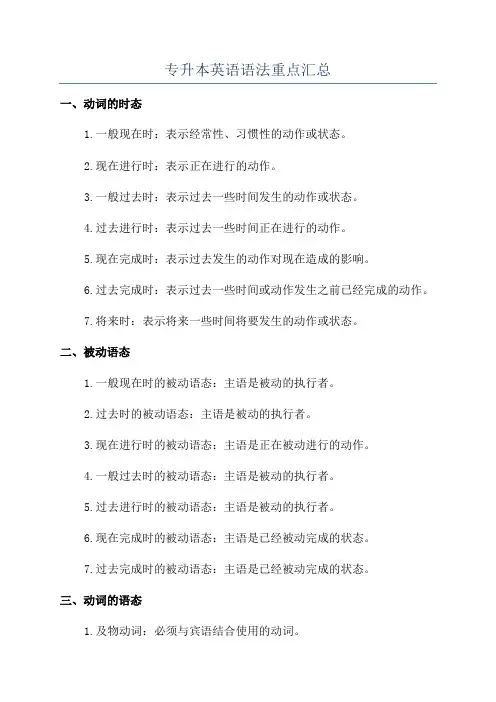
专升本英语语法重点汇总一、动词的时态1.一般现在时:表示经常性、习惯性的动作或状态。
2.现在进行时:表示正在进行的动作。
3.一般过去时:表示过去一些时间发生的动作或状态。
4.过去进行时:表示过去一些时间正在进行的动作。
5.现在完成时:表示过去发生的动作对现在造成的影响。
6.过去完成时:表示过去一些时间或动作发生之前已经完成的动作。
7.将来时:表示将来一些时间将要发生的动作或状态。
二、被动语态1.一般现在时的被动语态:主语是被动的执行者。
2.过去时的被动语态:主语是被动的执行者。
3.现在进行时的被动语态:主语是正在被动进行的动作。
4.一般过去时的被动语态:主语是被动的执行者。
5.过去进行时的被动语态:主语是被动的执行者。
6.现在完成时的被动语态:主语是已经被动完成的状态。
7.过去完成时的被动语态:主语是已经被动完成的状态。
三、动词的语态1.及物动词:必须与宾语结合使用的动词。
2.不及物动词:不需要与宾语结合使用的动词。
四、倒装句1.完全倒装:把助动词或情态动词放在主语前。
2.部分倒装:把助动词或情态动词放在谓语动词前。
五、情态动词1. can:表示能力、许可、可能。
2. could:表示过去的能力、许可、可能。
3. may:表示允许、可能。
4. might:表示过去可能。
5. must:表示推测、必须。
6. shall:表示将来的意愿。
7. should:表示建议、应该。
8. will:表示将来。
9. would:表示过去习惯、愿意。
六、名词1.可数名词:可以用来计数的名词。
2.不可数名词:不可以用来计数的名词。
3.特殊名词变复数形式。
4.特殊名词变单数形式。
七、形容词和副词1.形容词在句中的位置。
2.形容词比较级和最高级。
3.副词在句中的位置。
4.副词比较级和最高级。
五、代词1.主格代词:作为主语的代词。
2.宾格代词:作为宾语的代词。
3.物主代词:表示所属关系的代词。
4.反身代词:表示动作反过来作用于自己的代词。
专升本英语语法讲义
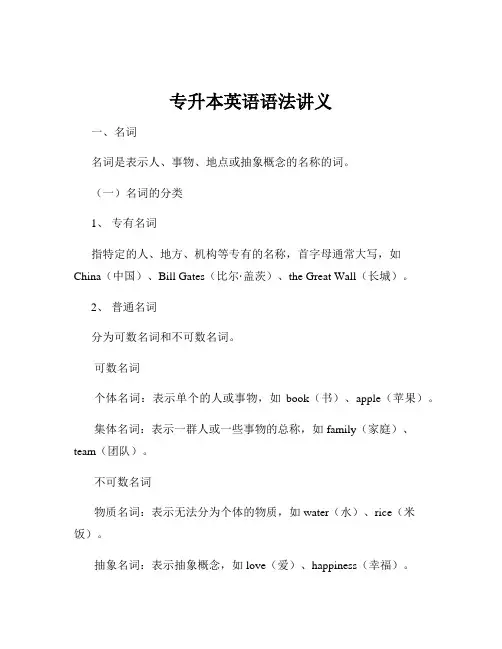
专升本英语语法讲义一、名词名词是表示人、事物、地点或抽象概念的名称的词。
(一)名词的分类1、专有名词指特定的人、地方、机构等专有的名称,首字母通常大写,如China(中国)、Bill Gates(比尔·盖茨)、the Great Wall(长城)。
2、普通名词分为可数名词和不可数名词。
可数名词个体名词:表示单个的人或事物,如book(书)、apple(苹果)。
集体名词:表示一群人或一些事物的总称,如 family(家庭)、team(团队)。
不可数名词物质名词:表示无法分为个体的物质,如 water(水)、rice(米饭)。
抽象名词:表示抽象概念,如 love(爱)、happiness(幸福)。
(二)名词的数1、可数名词的复数形式一般在名词后加 s,如 books,apples。
以 s,x,ch,sh 结尾的名词,加 es,如 buses,boxes,watches,dishes。
以辅音字母+ y 结尾的名词,把 y 变为 i 再加 es,如 city cities,baby babies。
但以元音字母+ y 结尾的名词,直接加 s,如 boy boys,day days。
以 f 或 fe 结尾的名词,把 f 或 fe 变为 v 再加 es,如 knife knives,leaf leaves。
但有些词直接加 s,如 roof roofs,chief chiefs。
不规则变化,如 man men,woman women,child children,foot feet,tooth teeth 等。
2、不可数名词的量化不可数名词要表示数量,需要用量词短语,如 a piece of paper(一张纸),a cup of coffee(一杯咖啡),two bottles of water(两瓶水)。
(三)名词的所有格1、表示有生命的名词的所有格一般在名词后加's,如 Tom's book(汤姆的书)。
专升本英语语法与词汇知识点总结
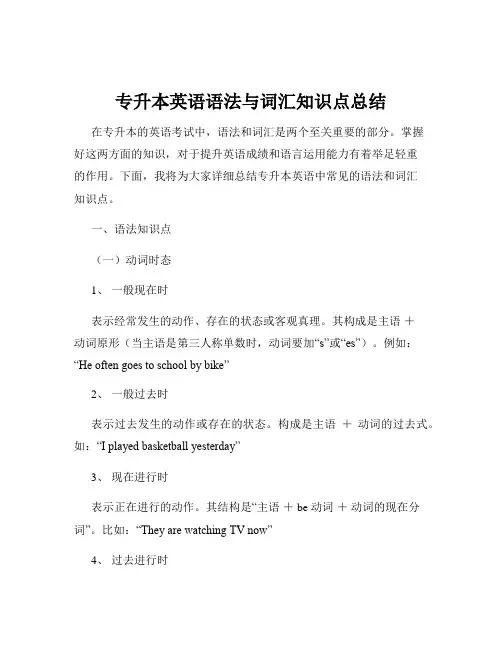
专升本英语语法与词汇知识点总结在专升本的英语考试中,语法和词汇是两个至关重要的部分。
掌握好这两方面的知识,对于提升英语成绩和语言运用能力有着举足轻重的作用。
下面,我将为大家详细总结专升本英语中常见的语法和词汇知识点。
一、语法知识点(一)动词时态1、一般现在时表示经常发生的动作、存在的状态或客观真理。
其构成是主语+动词原形(当主语是第三人称单数时,动词要加“s”或“es”)。
例如:“He often goes to school by bike”2、一般过去时表示过去发生的动作或存在的状态。
构成是主语+动词的过去式。
如:“I played basketball yesterday”3、现在进行时表示正在进行的动作。
其结构是“主语+ be 动词+动词的现在分词”。
比如:“They are watching TV now”4、过去进行时强调过去某个时间正在进行的动作,形式为“主语+ was/were +动词的现在分词”。
像:“I was reading a book at that time”5、现在完成时表示过去发生的动作对现在造成的影响或结果,或者从过去开始一直持续到现在的动作。
其构成是“主语+ have/has +过去分词”。
例如:“She has learned English for five years”6、过去完成时表示过去某个时间之前已经完成的动作,结构是“主语+ had +过去分词”。
比如:“By the end of last year, we had learned 2000 words”(二)语态1、主动语态主语是动作的执行者。
例如:“He opened the door”2、被动语态主语是动作的承受者,构成是“be +过去分词”。
如:“The door was opened by him”(三)非谓语动词1、动词不定式具有名词、形容词和副词的特征,可作主语、宾语、定语、状语等。
专升本《英语》词汇与语法结构
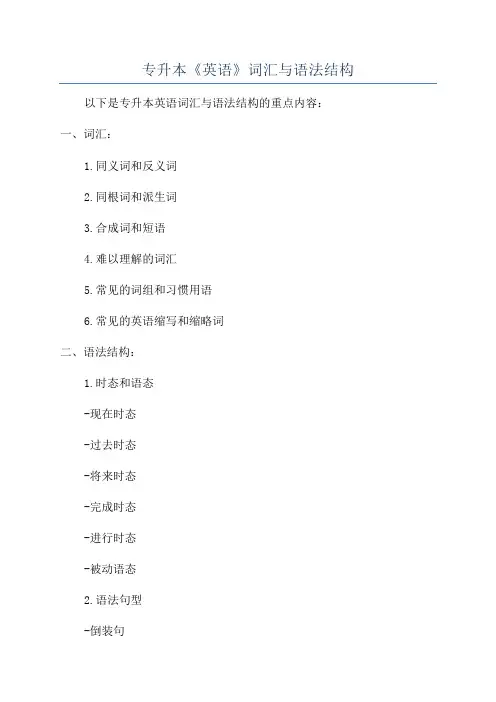
专升本《英语》词汇与语法结构以下是专升本英语词汇与语法结构的重点内容:
一、词汇:
1.同义词和反义词
2.同根词和派生词
3.合成词和短语
4.难以理解的词汇
5.常见的词组和习惯用语
6.常见的英语缩写和缩略词
二、语法结构:
1.时态和语态
-现在时态
-过去时态
-将来时态
-完成时态
-进行时态
-被动语态
2.语法句型
-倒装句
-条件句
-间接引语和直接引语
-强调句
3.从句和复合句
-名词性从句(主语从句、宾语从句、表语从句、同位语从句)-定语从句
-状语从句
-表语从句
4.代词和词性
-人称代词和物主代词
-反身代词和相互代词
-指示代词和疑问代词
-不定代词和关系代词
5.形容词和副词
-基本形容词和副词的比较级和最高级
-修饰方式、程度、时间和频率的副词
-形容词和副词的转化
6.名词和数词
-可数名词和不可数名词
-单数名词和复数名词
-名词的所有格
-基数词和序数词
以上是专升本英语词汇与语法结构的主要内容,希望对你的学习有帮助。
专升本英语语法:16种英语时态(用法+例句)
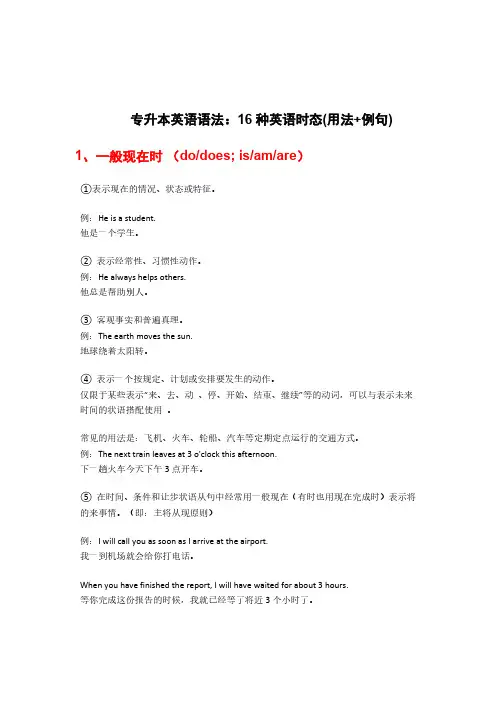
专升本英语语法:16种英语时态(用法+例句)1、一般现在时(do/does;is/am/are)①表示现在的情况、状态或特征。
例:He is a student.他是一个学生。
②表示经常性、习惯性动作。
例:He always helps others.他总是帮助别人。
③客观事实和普遍真理。
例:The earth moves the sun.地球绕着太阳转。
④表示一个按规定、计划或安排要发生的动作。
仅限于某些表示“来、去、动、停、开始、结束、继续”等的动词,可以与表示未来时间的状语搭配使用。
常见的用法是:飞机、火车、轮船、汽车等定期定点运行的交通方式。
例:The next train leaves at3o'clock this afternoon.下一趟火车今天下午3点开车。
⑤在时间、条件和让步状语从句中经常用一般现在(有时也用现在完成时)表示将的来事情。
(即:主将从现原则)例:I will call you as soon as I arrive at the airport.我一到机场就会给你打电话。
When you have finished the report,I will have waited for about3hours.等你完成这份报告的时候,我就已经等了将近3个小时了。
2、现在进行时(am/is/are doing)①表示此时此刻正在发生的事情。
例:He is listning to the music now.他现在正在听音乐。
②表示目前一段时间内一直在做的事情,但不一定此时此刻正在做。
例:I am studying computer this term.这个学期我一直在学习计算机。
③现在进行时可以表示将来的含义。
a.瞬时动词的进行一定表将来。
例:I am leaving.我要离开了。
b.持续动词的进行只有有将来的时间状语或有将来语境中才表将来。
例:I am travelling next month.下个月我要去旅行。
专升本考试英语语法总结

目录一、句子成分与基本结构(包括时态) .................... 错误!未定义书签。
二、不定式................................................................... 错误!未定义书签。
三、动词的时态和语态 .............................................. 错误!未定义书签。
一般现在时的特例 ...................................................... 错误!未定义书签。
一般过去时的注意点................................................... 错误!未定义书签。
一般将来时的注意点................................................... 错误!未定义书签。
四、非谓语动词 ...................................................... 错误!未定义书签。
五、复合式谓语 ...................................................... 错误!未定义书签。
六、动词的虚拟语气............................................... 错误!未定义书签。
七、状语从句 .......................................................... 错误!未定义书签。
1、时间状语从句 ........................................................ 错误!未定义书签。
2.地点状语从句 ........................................................... 错误!未定义书签。
英语专升本语法知识点汇总
英语专升本语法知识点汇总一、时态。
1. 一般现在时。
- 用法:- 表示经常或习惯性的动作或存在的状态。
例如:I go to school by bike every day.(我每天骑自行车去上学。
)- 表示客观事实或普遍真理。
例如:The earth moves around the sun.(地球绕着太阳转。
)- 结构:- 主语为第三人称单数(he/she/it等)时,动词要加 -s或 -es,如He likes reading. 其他人称用动词原形,如I like reading.2. 一般过去时。
- 用法:- 表示过去某个时间发生的动作或存在的状态。
例如:I visited my grandparents last weekend.(我上周末去看望了我的祖父母。
)- 结构:- 动词一般用过去式形式。
规则动词的过去式一般在词尾加 -ed,如work - worked;不规则动词有其特殊的过去式形式,如go - went。
3. 一般将来时。
- 用法:- 表示将来某个时间要发生的动作或存在的状态。
例如:I will go to Beijing next month.(我下个月将去北京。
)- 结构:- 常见的结构有will+动词原形,be going to+动词原形(表示计划、打算做某事或有迹象表明即将发生某事)。
如He is going to have a party tonight.(他今晚打算举办一个聚会。
)4. 现在进行时。
- 用法:- 表示现在正在进行的动作或存在的状态。
例如:She is reading a book now.(她现在正在读一本书。
)- 结构:- be动词(am/is/are)+动词的 -ing形式。
5. 过去进行时。
- 用法:- 表示过去某个时刻或某段时间正在进行的动作。
例如:I was watching TV at 8 o'clock last night.(昨晚8点我正在看电视。
专升本英语语法与词汇
专升本英语语法与词汇.第一章时态英语中谓语动词的时态(Tense)是一种动词的形式,不同的时态用以表示在不同的时间完成的动作或保持的状态。
英语动词共有十六种时态,这里将重点讲解其中较常用的十种时态。
一、一般现在时( The Present Indefinite Tense)1. 用于表示客观事实, 现在反复发生或习惯性的动作以及存在的特征、状态等,常与often, always, sometimes, usually, once a week, every day, seldom等时间状语连用。
【例句】The earth revolves around the sun.The students get up at six thirty every morning.2.表示按计划或安排好的将来的动作,常使用arrive, be, go, start, stay等动词。
【例句】There is a dancing party tonight.The plane arrives in Beijing at three this afternoon.3.用在以as soon as, when, after, while, as, until, till, whenever, the monment,theminute, immediately, directly等引导的时间状语从句中或以if, unless, as/so long as, in case, provided that等引导的条件状语从句中,代替一般将来时。
【例句】I’ll ring you as soon as he comes back.If it is fine tomorrow we will go swimming.The machine starts running the moment the button is pressed.●注:if条件句中,有will出现时,will是情态动词,意义为“愿意”,“肯”。
专升本_大学英语语法总结
语法讲义一:时态:所谓的"时态",就是时间+状态。
谓语动词的时态见下表:1.主动形式2.被动形式CET-4 常考的三种时态:过去完成时;将来完成时;(现在/过去)完成进行时。
时间状语从句当中的时态:一般过去时所有的过去用一般现在时表示现在和将来现在完成时现在完成和将来完成一.非谓语动词一.不定式:一)不定式的常考形式:1)一般形式:He decided to work harder in order to catch up with the others.被动形式: He preferred to be assigned some heavier work to do.语法功能:表示与谓语动词同步发生2)完成形式:He pretended not to have seen me.被动形式:The book is said to have been translated into many languages.语法功能:表示发生在谓语动词之前二)不定式常考的考点:1)不定式做定语----将要发生2)不定式做状语----目的3)不定式充当名词功能---To see is to believe.三)不定式的省略1)感官动词 see, watch, observe, notice, look at, hear, listen to, smell, taste, feel+ do表示动作的完整性,真实性;+ doing表示动作的连续性,进行性I saw him work in the garden yesterday.昨天我看见他在花园里干活了。
(强调"我看见了"这个事实)I saw him working in the garden yesterday.昨天我见他正在花园里干活。
(强调"我见他正干活"这个动作)感官动词后面接形容词而不是副词:The cake tastes good; It feels comfortable.2) 使役动词 have bid make let 等词后不定式要省略但同1)一样被动以后要还原toI ‘d like to have John do it.I have my package weighed.Paul doesn’t have to be made to learn.3) help help sb do help sb to do help do help to do四)有些动词后只跟不定式如:want,wish,hope,manage,promise,refuse,pretend,plan, offer,decide,agree,expect allow sb to do, cause sb to do , permit sb to do, enable sb to doforce sb to do. be more likely to do love to do warn sb to do be able to dobe ambitious to do. begin to do . start to do五) 有的时候to后面要接-ing形式accustom (oneself) to; be accustomed to; face up to; in addition to; look forward to; object to; be reduced to; resign oneself to; be resigned to; resort to; sink to; be used to; be alternative to; be close/closeness to; be dedication/dedicated to; be opposition/opposed to; be similarity/similar to.三、need/want 后的-ing形式具有被动的意思。
专升本英语语法知识点精讲
专升本英语语法知识点精讲对于许多想要通过专升本来提升自己学历的同学来说,英语语法是必须要攻克的难关之一。
掌握好英语语法不仅能够帮助我们在考试中取得好成绩,更能为今后的英语学习打下坚实的基础。
接下来,就让我们一起深入了解一些专升本英语语法的重要知识点。
一、动词时态动词时态是英语语法中的核心内容。
在专升本考试中,常见的时态包括一般现在时、一般过去时、一般将来时、现在进行时、过去进行时、现在完成时、过去完成时和过去将来时。
1、一般现在时表示经常发生的动作、客观事实或真理。
例如:“The earth revolves s around the sun”(地球绕着太阳转。
)其构成是主语+动词原形(当主语是第三人称单数时,动词要加“s”或“es”)。
2、一般过去时用于描述过去发生的动作或状态。
比如:“I played basketball yesterday”(我昨天打篮球了。
)构成是主语+动词的过去式。
3、一般将来时表示将来要发生的动作,常见的表达有“will +动词原形”和“be going to +动词原形”。
例如:“I will go to Beijing next week” (我下周要去北京。
)4、现在进行时表示正在进行的动作,结构为“be +现在分词”。
如:“She is reading a book now”(她现在正在读书。
)5、过去进行时强调过去某个时刻正在进行的动作,“was/were +现在分词”是其构成形式。
像:“I was watching TV at 8 o'clock last night” (昨晚八点我正在看电视。
)6、现在完成时表示过去发生的动作对现在造成的影响或结果,或者从过去开始一直持续到现在的动作。
“have/has +过去分词”为其结构。
例如:“I have learned English for five years”(我学英语已经五年了。
)7、过去完成时在过去某个时间点之前已经完成的动作,由“had +过去分词”构成。
- 1、下载文档前请自行甄别文档内容的完整性,平台不提供额外的编辑、内容补充、找答案等附加服务。
- 2、"仅部分预览"的文档,不可在线预览部分如存在完整性等问题,可反馈申请退款(可完整预览的文档不适用该条件!)。
- 3、如文档侵犯您的权益,请联系客服反馈,我们会尽快为您处理(人工客服工作时间:9:00-18:30)。
语法第一节词性一.名词1. 名词作形容词使用名词可以修饰名外一个名词,起定语的作用,或于另一名词构成合成词。
这时作定语用的名词一般用作单数名词。
They live in a country house.他们住在乡下的房子里。
He often visits a night club.他经常去夜总会。
2. 名词的所有格1) 表示人或动物以及拟人化事物的名词在词位加’构成所有格,例如:the gentleman’ car , the dog’ food.这种所有格也可以用于表示时间、重量、距离等的名词,如:yesterday’s news; three hour’s journey.2) 如果修饰语有如下情况,应该在前面加of构成其所有格。
(1)表示无生命事物:the window of the house; the color of the car(2)集体名词:the capital of the firm, a member of this society(3)the+形容词:the misfortune of the young, the mystery of this coc iety(4)当a, an, this, these, that, any, some, no等词和所有格名词修饰同一名词时,需要同时用以上两种形式,称为双重所有格:I don’t use Tom’s car because I don’t quite appreciate that car of this.(5)有些时候两个名词所有格并列使用,他们后面的名词若分别属于两者所有,须在两个名词所有格后面分别加’s;若属于两个名词所共有,则在第二个名词后面加’s:Martin and Alice’s car broke down again, but luckly they knew how to fix it. (car为单数,说明这辆车市他们两个人所有。
)(6)用连字符号连接的两个或者两个以上的词作定语时,其中的名词不能用复数:100-metre race(百米跑)3) 名词的数绝大多数棵树名词的复数形式为名词加-s或者-es, 以辅音字母+y结尾的名词要先变y为i,再加es.不规则名词的复数形式(1)单复数词干不同man-men; child-children; foot-feet; tooth-teeth; goose-geese; ox-oxen; mouse-mice;(2)以o结尾的单词negro-negroes; echo-echoes; hero-heroes; potato-potatoes; mosquito-mosquitoes; volcano-volcanoes; motto-mottoes; memo-memoes (3)以f或者fe结尾的词以辅音字母+f(fe)结尾的名词要先变f(fe)为v,再加esthief-thieves; wife-wives; calf-calves(4)只做复数的名词people; cattle; police; personnel形似复数,实际作为单数使用的名词physicals; mathematics; news; means; statistics; works二.不定代词不定代词指那些没有明确指出替代对象的代词,也就是说,是那些不指明替代任何特定名词或形容词的代词。
不定代词可以分为以下两类:名词性不定代词——在句中可以单独作主语、宾语、表语或同位语等。
形容词不定代词——在句中只能充当修饰语——定语。
有很多的不定代词即可用作形容词性不定代词,也可用作名词性不定代词。
不定代词所包括的各种代词和基本用法如下表:1.all用作名词性不定代词时,可用作单数,也可用作复数。
这取决于它指代的对象的含意(例如,指人时为复数,指不具体事物时被视为单数);或取决于all指定的名词的用法(如可数,不可数,单数或复数等)。
(例)All were agreed. 大家都同意了。
All is still. 万籁俱寂。
All of 后可跟可数名词,也可跟不可数名词。
(例)All (of) the people were very happy. 人人皆大欢喜。
All of the money is yours. 所有这些钱都是你的。
“all of+人称代词宾格”结构中的of不能省去。
(例)All of us succeeded.We all succeeded.“all+数目字+复数名词”结构中的all后不能加of。
(例)All(the)six boys arrived late. 六个男孩都迟到了。
“all of +the/that/my等限定词+名词”结构中的of可省略。
(例)All(of)the milk is spilt. 牛奶都溢光了。
2.all为形容词性不定代词时,可修饰复数可数名词和不可数名词。
“all+复数名词”或“all+ the+复数名词”,意为“所有的、全部的”。
(例)All things are difficult before they are easy.万事开头难。
(所有的事情都是先难后易。
)All the students in the class passed the exam.班里全体学生都通过了考试。
“all+复数名词”表示泛指;“all +the+复数名词”用于特指。
“all+单数可数名词”,表示“整个的,全部的,”也可强调“惟一”或进行对比。
(例)She hopes with all her heart that he’ll be happy.她真心诚意地希望他幸福。
That humble little house was all the home that I ever had. 那幢简陋的小房子是我惟一的居所。
She ate all the cake. 她把一块蛋糕全吃了。
“all+(the)+表示时间的单数名词”表示“贯穿(从头到尾地)”。
all (the) day (long)一整天all (the) night一整夜all (the) morning一上午all winter整个冬天(例)He stayed there all the year(round).他在那儿呆了一整年。
I haven’t worked all (the) day.我一天都没工作。
注意:这里短语用在否定句中时,通常可不加the。
“all+专有名词”表示“全部、整个”。
all China全中国(的人)all Japan全日本(的人)(例)A general strike paralyzed all Paris that day.那一天,大罢工使整个巴黎瘫痪了。
“all(+限定词)+不可数名词”表示“一切的、全部”。
(例)All my money was spent. 我的钱全部用光了。
All hope has gone. 一切希望都已化为泡影。
“all+表示性质、程度等抽象概念的不可数名词”表示“最大限度”。
with all possible speed尽可能快地,火急in all honesty十分实地in all earnestness十人分认真地be all sweetness非常温柔in all truth的确be all cordiality十分热诚(例)He suddenly became all attention. 他突然全神贯注(地听)。
She was all tenderness and kindness.她对人非常亲切和蔼。
The girl was all disappointment to her mother.那女孩令她母亲十分失望。
He spoke in all sincerity. 他极其诚恳地说。
He was all politeness. 他温文尔雅。
The storm raged in all its fur y. 暴风雨肆遽一时。
这样的短语在句中多作表语或状语。
all在表示“最大限度”这一含意时,也可跟表示身体一部分的名词(视情况用单数或复数)一起用作表语,表达与该名词相关的状态。
(例)The boy is all thumbs. 那孩子笨手笨脚的。
He was all skin and bones. 他瘦得皮包骨头。
She was all eyes. 她凝神细看。
He was all ears. 他仔细倾听。
3.each和every的比较它们都可译成“每一个”,都可与单数可数名词连用。
Each既可用作名词性代词(单数,其后不跟名词或代词one),也可用作形容词性代词,作其它单数可数名词或one 的定语。
Every却只能作定语,修饰单数可数名词,或代词one。
Every也可用来修饰intention, kindness, sympathy, reason, concern, at tempt, encouragement, respect等抽象名词,意为“很大的”,“充分的”。
(例)Each has his merits. 人各有所长。
Each boy may try twice. 每个孩子可以试两次。
Every room in this hotel has a private bathroom.这家旅馆的每间客房都带有浴室。
each用于有两个或两个以上的人或物,而every及其合成词用在有三个或三个以上的人或物时。
each强调个体,倾向于把整体分开来考虑;“every+单数可数名词/one”及everyone(-body),everything等,都强调全体,把分散的个体集中为一个整体看待,暗示“无一例外”。
each通常要指代前文中已提到的人或物,但“every+单数可数名词/one”和everyone(-body)等无此限制。
(例)Two boys entered. Each (boy) was carrying a suitcase.两个服务员走进来,他们每人都提着一只衣箱。
There were three boys in the room, and I gave an apple to each/everybody.屋子里有三个孩子,我给他们每人一个苹果。
Everyone has his faults. 人人都有不足之处。
I will do everything in my power to assist you.我会做一切力所能及的事来帮你。
every与each都可与one连用。
但要注意every one(指人或物,表达的是数量)与everyone(指人)的区别。
